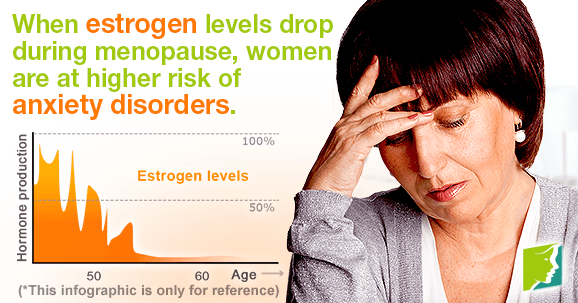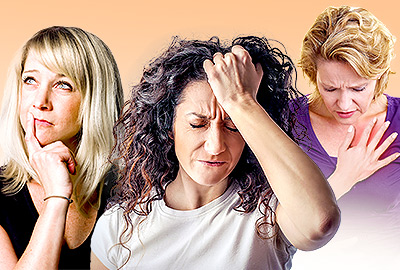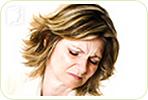Anxiety disorders affect around 25 million Americans on average and are twice as common in women as in men. Anxiety is defined as a psychological state that is described as the overwhelming, insistent feelings of worry.
Stress is a common trigger for anxiety, and can affect almost every physical process in the body, like blood pressure, digestion, and cholesterol levels. Stress affects women in their 50s because the hormone fluctuations they experience during menopause make them more susceptible. This article features the common triggers, symptoms, and treatments for anxiety and stress in your 50s.
Anxiety Disorders
There are several kinds of anxiety disorders, including generalized anxiety disorder, panic disorder, social phobia, post-traumatic stress disorder, and obsessive compulsive disorder. Many triggers can influence anxiety disorders, but the primary cause of anxiety in middle-aged women is hormone fluctuations experienced during menopause. A woman's estrogen levels fluctuate, decrease, and then stay consistently low during the menopause transition.
Estrogen significantly impacts the brain's regulation of mood and cognition. Consequently, when a woman's estrogen levels drop, she is at higher risk of mental health disorders. Other factors that can induce anxiety include high stress, genetics, certain medications, emotional trauma, lack of exercise, and poor diet. Common symptoms of anxiety to look out for are sweating, irritability, dizziness, feelings of dread and intense fear, increased heart rate, shortness of breath, muscle tension, and insomnia.
Stress
Stress is a defense response that can be beneficial in small doses; it can help you stay alert and give you the energy to face a challenge. However, when stress is excessive and constant, it can negatively affect your physical and mental health. Stress can be short term or long term, and can be triggered by a number of things, such as losing your job, relationship problems, children moving out, or death of a loved one. Common symptoms of stress include lack of energy, difficulty concentrating, irritability, body aches, and forgetfulness.
Treatments for Anxiety and Stress
It is important to try to reduce stress in order to manage anxiety, as well as for your overall health and well-being. Some ways to do this are:
Exercise
Regular physical activity triggers the brain to release serotonin, a mood-regulating neurotransmitter. This means at least 30 minutes of aerobic activity daily a total of five times per week can help. Exercising regularly has been known to improve mood, reduce stress, and increase energy. Walking, yoga, and swimming are all good forms of low-impact workouts that can help lower anxiety and stress.
Eat healthy
Making simple dietary changes can be beneficial in lessening anxiety and stress. Try to include plenty of protein, fiber, fatty acids, fruits, and vegetables into every meal is ideal for optimum performance and boosting energy.
Relax
Taking time every day for yourself is crucial for feeling good and treating anxiety. Taking a bath after a long day, reading, or meditating are all effective ways to relax the body and mind. Making time to talk with close friends and family can also help you relax and let go of the day's worries. Having a strong support system is key to mental health.
Anxiety and stress can be detrimental to your overall health, especially in your 50s. Stress is a common trigger of anxiety and can affect your relationships and ability to carry out everyday tasks. It is vital to try and manage anxiety and stress as much as possible. Helpful ways to relieve stress are getting regular exercise and taking time to relax.
Sources
- Office on Women's Health. (2012). Anxiety disorders fact sheet. Retrieved September 18, 2014, from http://www.womenshealth.gov/publications/our-publications/fact-sheet/anxiety-disorders.html
- Office on Women's Health. (2012). Stress and your health fact sheet. Retrieved September 18, 2014, from http://www.womenshealth.gov/publications/our-publications/fact-sheet/stress-your-health.html
- Schoenfield, T.J. et al. (2013). Physical exercise prevents stress-induced activation of granule neurons and enhances local inhibitory mechanisms in the dentate gyrus. The Journal of neuroscience, 33(18), 7770-7777. doi: 10.1523/JNEUROSCI.5352-12.2013




